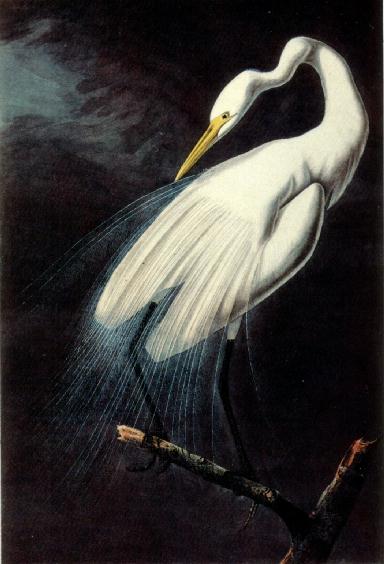American Poetry

George Held
American Poetry
George Held
Acknowledgments
Blue Unicorn: “To Discord”The Chariton Review: “La Trahison des Clercs Postmodernes”
The Edge City Review: “Some Editors”
The Formalist: “American Poetry”
Free Lunch: “Christmas in Lower Manhattan, 2001” and “Questionnaire”
The Iconoclast: “Where I Stopped Reading”
Long Island Quarterly: “Raking Leaves”
The Lyric: “On Time”
Midwest Poetry Review: “Ditty for Spring”
The Neovictorian/Cochlea: “To Melancholy”
Piedmont Literary Review: “The Goal”
Plainsongs: “Giving Place” and “Hippies at 2000”
Troubadour: “Imagine That”
The Wallace Stevens Journal: “The Large Blue Sonnet”
© 2003 by George Held
Cover art: American Egret (1831) by John James Audubon
Published by The New Formalist Press
XHTML & CSS design by Leo Yankevich
For Roz
Dimon and James Dawson
American Poetry
(After Louis
Simpson)
Whatever it is, it must be deafto tone, oblivious to rhythm,
resistant to rhyme.
It must be open of form,
that is, free of verse,
avant of garde for better or worse.
Some Editors
Some editors reject and chide me,Send us no rhyme and no meter.
They’d turn down Frost, Yeats, and Heaney;
I pray they’re turned down by St. Peter.
The Goal
The goal is to use just ten words per lineIn each line of the piece through the last one—
A fool’s task, it is true, but why not fine
Tune a form that tempts, bids one to have fun?
But what to write on—a tense true tale of
Boy meets girl or girl leaves boy or same-sex
Loss of mate or star-crossed souls out of love
Or lost at sea on board a ship that wrecks
On rocks that rim a shore? Tell me no more
Old tales, ones that bore, but add salt and spice
To prick up my ears, stir me till I soar
On taut hawk wings and stretch my span of sights.
Now test the length of each line once for all:
You’ll find I’ve reached my goal, yet cast no pall.
On Time
We waste you, mark you, try not to lose trackOf you. We keep you, and convicts do you.
A stitch of you saves nine, yet at my back
I hear your winged chariot draw near.
You are of the essence or out of joint;
We are on you and try to be in you
And we work over you as you go by,
Personified as Father each New Year.
When you are ripe you’re one of those that try
Men’s souls; the best of you and worst of you
Imbue our lives, yet you wait for no one.
But mostly you mark our words with measure,
Dwelling in verbs under the guise of tense,
To give our sentences a guise of sense.
To Discord
Stop that din, that clanging inside my brain!Just as I reach accord between psyche
And soul, you drum up a cacophony
To unbalance me—silent commotion
Of woofers and tweeters, mean distortion
Of the sound music my authority
Has to maintain, a neural harmony,
If I’m to play my lyre with nuanced tone.
For me, that demands performing solo,
Yet you would sound a note of temptation—
A willing woman, a controlled substance—
To dash my accord with sweet dissonance
That leaves me deaf to reason, but also
Brings me joy beyond harmonic motion.
The Large Blue Sonnet*
Let it be large, and let it be blue, too.And why not?—since a poem is a meteor,
It can have girth and it can have hue, too.
If the poem is a nature created
By the poet, let it cut in the night sky
such a path as will leave it undated.
Let it fly, since a poem is a pheasant,
its ring neck and gaudy plumage daytime
rivals to the nighttime show of planets.
Let it serve espresso, cappuccino,
since a poem is a cafe, in Montmartre,
umbrellas courtesy of Cinzano.
Poems are new subjects, new reality,
Large and blue, a passport to eternity.
• This title and the
italicized language below are from the notebooks of Wallace
Stevens.
To Melancholy
(Rondeau)
She dwells with
Beauty ....
—Keats, “Ode on Melancholy”
Melancholy, you wear me down,—Keats, “Ode on Melancholy”
Crease my mouth’s corners in a frown,
And bring on a fitful longing
For times my heart burst with singing,
Like a nightingale nigh the lawn.
How can I face another dawn
Filled with your black bile, just a pawn
To your malign maneuvering,
Melancholy?
Burton called you damned yet divine,
Anatomizing your renown;
Keats saw you with Beauty dwelling.
But we resist you by ingesting
Zoloft© till our depression’s flown,
Melancholy.
La Trahison des Clercs Postmodernes
Those who use literature as a pretextFor their own subversive agenda
Replace novels, stories, and poems with “text”
And doom themselves to end notes and addenda.
Imagine That
When the imagination has withered,Shriveled up like last year’s apple mummies,
And you’ve turned fruitless as a winter orchard,
With no hope of the first hint of buds’ green,
You’ll know the low that’s called acedia,
Deemed a sin by Church Fathers, innocent
Of psychology, who could not reckon
The etiology of such dementia
And blamed moral failure. If we fail, we fail,
Said Lady Macbeth, whose imagination
Then drove her mad, yet an imaginative
Drought can drive one mad . . . until renewal
Wells up through the mind’s crust and sends green shoots
Forth to flourish, fed by the fancy’s roots.
Ditty for Spring
When pear trees bloomIn April time
It’s none too soon
For planting thyme
And rosemary
And other crops
For savory
Autumn table-tops.
Giving Place
Give place to others, as others have given place
to you.
—Montaigne
Good advice for the birds, maybe, but for us?—Montaigne
Aren’t we supposed to rage against dying,
Do all to deny Death’s ultimate kiss,
That tangles the tongue and stills the breathing?
Dying’s just joining the long procession
Going back to Adam and never ending,
Like trained elephants lumbering in line,
Joined trunk by tail, at the mahout’s bidding.
“Giving place” will be the euphemism
Du jour, blessed by Environmentalists
As an act of space-saving altruism—
Stepping down, not thrown into the abyss.
Glide into death, give up the ghost with grace;
Someone will blindly be born in your place.
Questionnaire for Our 45th Reunion
Do you remember infantile paralysis?How long have you been going to AA?
How many children have you lost to AIDS?
Were you the victim or perpetrator of abuse?
How long have you been in psychoanalysis?
Which drugs have you been addicted to?
How often do you question the status quo?
When was the last time you faced the abyss?
How many adulterous affairs have you had?
When did you last believe in God?
At what age did you put your parents away?
How sharp is your short-term memory?
How many operations have you survived?
Aren’t you glad you are still alive?
Hippies at 2000
Hippies who thought they’d never grow oldSquint and frown through bifocal lenses,
Have silicon injected into folds
Of skin too wrinkled to behold
In the rear-view mirrors of Mercedes Benzes
As they marvel that Hippies ever grow old.
Acid and pot turned their lives into gold
In the ’Sixties. 2000 numbs the senses
To all but filling their billfolds.
The Aquarian Age never foretold
Arthritis, stroke, or the woes of post-menses
For Hippies who thought they’d never grow old.
The new millennium finds them enrolled
In HMO’s, AARP, and taking pauses
To dream of a youth that was rocked and rolled.
Yet the grave, if I may be so bold,
Will conclude all their far-out experiences;
For Hippies who’ve finally grown old,
It will be the last Be-in of the fold.
Christmas in Lower Manhattan, 2001
Let’s not make too much of it—citizensRoasting in an open fire, Jack Frost nipped
In the bud of global warming, the lost
Hope for the Christ child in Holiday songs
Sung by a choir. Let’s swallow the late news
That Scrooge has won the battle of humbug,
That Tiny Tim stayed crippled and died young,
That no god can bless us one and all—views
That curdle the eggnog of our foursquare
Celebration of platitude and myth.
Let’s look past the void in the skyline, dare
To live closer to ground zero, to earth;
Let’s join hands around the Yule log’s fire,
And praise the essential—friends, water, air.
Where I Stopped Reading
“She developed
problems with
heroin and cocaine.”
— NY Times celebrity interview
She developed problems with heroin and cocaine,heroin and cocaine.”
— NY Times celebrity interview
like developing a case of the flu
or a roll of film. Isn’t it plain?
She developed problems with heroin and cocaine—
didn’t “abuse drugs,” like me or like you.
Exculpation has its own legerdemain:
one “develops problems with” heroin and cocaine,
with fondling children or gassing the Jews.
Raking Leaves
Bamboo teeth claw the fall leaves from my lawn,Disinterring apple mummies, their skin
Grey with death; others squish like fresh dogshit
Under my heel, the aroma of rot
Blending with the leaves’ fungal scent
On a raw day. I savor smells, season’s
Bounty as much as the field’s or orchard’s,
And relish the tug of muscles grown slack
From too many days spent behind a desk.
Body at work, senses alert, I leave
The leaves in piles while imagination weaves
Images into phrases that give shape
To another harvest. Who knows which crop
Will mean the most when my rake at last drops?
About the Author

George Held has published three poetry chapbooks, including Open & Shut, a winner of the 1999 Talent House Press Annual Chapbook Prize, and a book of poems, Beyond Renewal (2001). Absolut® Death and Others (2000) contains his poems and the paintings of Roz Dimon. He edited the poetry anthology Touched by Eros (2002) and co-edits The Ledge. His poems have appeared in numerous periodicals, including Commonweal, Confrontation, and Connecticut Review, and in anthologies, such as And What Rough Beast: Poems at the End of the Century, Troubadour: The Best of Rhyme at the Year 2000, and An Eye for and Eye Makes the Whole World Blind: Poets on 9/11. He is a poetry reviewer for The Philadelphia Inquirer and The American Book Review. With his wife, Cheryl, he resides in Greenwich Village.